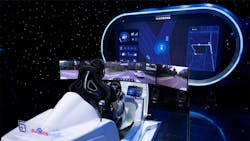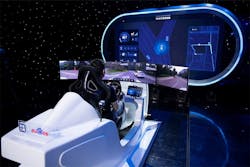Autonomous Driving Demo Uses Just a 5G Remote Backup Driver
At its annual Baidu World 2020 tech conference in Beijing, Zhenyu Li, Corporate Vice President of Baidu and General Manager of its Intelligent Driving Group (IDG), demonstrated the firm’s fully automated robo-taxis operating without human safety drivers behind the wheel. The driverless vehicles will be used in Baidu's "Apollo Go" robo-taxi service.
Instead of having safety drivers in the Apollo Go vehicles, the safe operation of the robo-taxis is backed up by a 5G-powered "Remote Driving Service" developed by Baidu. It allows human operators to remotely access the Apollo Go vehicles in the case of any emergencies or when the vehicle's software can’t handle the current situation.
When an Apollo Go vehicle finds itself in a situation it can’t navigate, Baidu has an option where passengers can call for remote assistance by pressing a button on the in-car screen. At that point, a remote driver will take over the vehicle with the help of smart transportation systems, vehicle-to-everything (V2X) technologies, and built-in 5G connectivity, which offers low latency.
The demonstration vehicle successfully navigated city streets, turned left, turned right, rounded a curve, stayed within its lane, avoided pedestrians, and performed a U-turn, all without a human behind the wheel.
Baidu’s Li predicted at the event that autonomous-driving technology will realize full commercialization in 2025. He also promised that “with each new generation of Apollo vehicles, the cost will be halved while performance will increase by tenfold.”
In 2019, Baidu partnered with FAW Group to launch a public robo-taxi service in Beijing and Guangzhou. To date, Baidu's driverless robo-taxis have been deployed in five cities in China, including also Changsha, Guangzhou, Cangzhou, and Chongqing. The latter has already fully deployed a complete 5G communications road network to support autonomous vehicles and connected vehicle technology.
Hardware for the fully autonomous robo-taxis is being installed during production in Chinese state-owned carmaker FAW Group’s Hongqi E-HS3 SUVs. The pre-installed hardware includes 360-degree cameras, LiDAR, GPS, ultrasound radar, and millimeter-wave radar.
The launch event was held at Baidu's Apollo Park. The test area supports the development of autonomous vehicles, as well as vehicle-to-vehicle (V2V) and vehicle-to-everything (V2X) technology, which allows vehicles to communicate with each other as well as to urban infrastructure, such as traffic lights.
According to Baidu, the Apollo platform has now released 600,000 lines of open source code from 45,000 developers and has 210 partners globally. Baidu’s research facility, located in Sunnyvale, Calif., is doing software engineering work on driverless cars, including deep learning for AI programs.
Catch the Bus, Too
Soon, self-driving buses will be joining the robo-taxi fleet. The Chinese automotive news service Gasgoo reported that Baidu Apollo has debuted the first (SAE) Level 4 autonomous bus in China. The company will deploy medium-sized buses on a test route in the Chinese municipality of Chongqing, picking up passengers at seven stops.
Baidu's Robus, which can accommodate up to 19 passengers, is equipped with four LiDAR units, two millimeter-wave radars, and seven monocular cameras. The bus was jointly developed by Baidu Apollo and Chinese bus manufacturer King Long.
The fully autonomous Robus is able to accurately stop at bus stations to drop off and pick up passengers, but is also said to be able handle more complex urban road conditions.
Automated Valet Parking
Apollo is also working on automated valet parking in partnership with Chinese electric-vehicle startup manufacturer WM Motor, which will launch a new model in 2021 that will be the first in China equipped with Level 4 autonomous valet parking technology. It will identify vacant parking slots in multistory parking garages and allow people to use the autonomous-parking and a smart summons function via mobile phone.
The system can identify vacant parking slots and park without human intervention just by learning from previous attempts or with the help of high-resolution maps. With fixed parking lots, the parking system only needs to learn the route once, and drivers can get out of the car before the vehicle completes the parking task by itself.
Baidu has created an onboard computing platform that powers the Valet Parking hardware and software. This computing platform is said to increase artificial-intelligence acceleration, performing 1.35 TOPS (trillion operations per second). The processor fuses sensor data from eight camera feeds, 12 channels of ultrasonic radar, LiDAR, and millimeter-wave radar interfaces.
So far, Baidu reports its Apollo platform has logged over three million miles of road tests without any accidents, and carried over 100,000 passengers in 27 cities around the world.
Baidu’s Apollo competes with other autonomous-vehicle technologies from Google’s Waymo, Intel, and Nvidia. Among the global partners contributing to the Apollo platform are automakers BMW, Daimler, Ford, Toyota, Volkswagen, and Honda.

